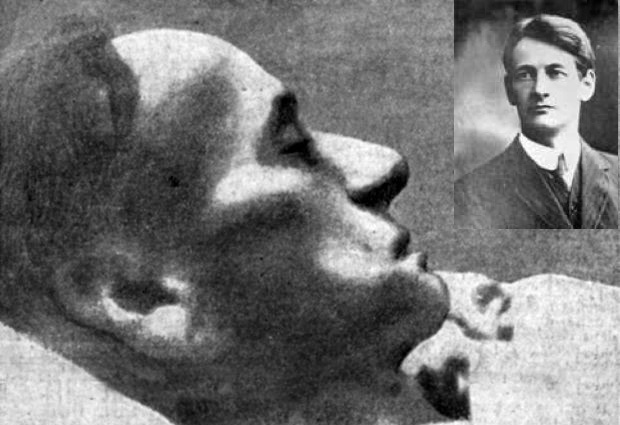
Terence MacSwiney, an Irish playwright, author and Sinn Féin Lord Mayor of Cork, died 100 years ago this week in a hunger strike strike which brought the Irish Republican campaign to worldwide attention.
Terence James MacSwiney was born at No 23 North Main Street, Cork on the 28th of March 1879, the fourth of 8 children born to John MacSwiney and Mary Wilkinson.
His father was a teacher in London who went to Italy to defend Rome from Garibaldi, and after these exploits he went back to his native Cork with his wife Mary and family. Young Terence left schoo at the age of 15 to financially support his mother and siblings, but continued his education with night classes, later enrolling at university and graduated with a degree in Moral Science in 1907.
A lover of literature, Terence wrote pamphlets and plays. He co-founded the Celtic Literary Society and the Cork Dramatic Society. This romantic rebel was also a serious revolutionary, helping to establish the Cork branch of the Irish Volunteers in 1913.
He was interned in Bromyard Internment Camp in Britain in 1917 and in the same year he married Muriel Murphy, a daughter of the famous Murphy’s Stout brewing family. In 1918 he was elected Sinn Féin MP for Cork but his life would take a fateful turn in March 1920 when the then Sinn Féin Mayor of Cork, Thomas Mac Curtain, was shot dead in front of his wife and son by a group of men with blackened faces, later found to be members of the Crown Forces.
Following the assassination, MacSwiney was asked to take up the chain of office. His time as Mayor was cut short six months later when British troops raided the City Hall and arrested him there on charges of ‘sedition’.
At his trial that September he was found guilty and declared after the verdict “I shall be free, alive or dead, within a month.”
Imprisoned in Brixton Prison in England, MacSwiney immediately began a hunger strike that sparked riots on the streets of Barcelona, caused workers to down tools on the New York waterfront, and prompted mass demonstrations from Buenos Aires to Boston.
Eleven IRA men took part in the hunger strike which also claimed the life of two others. Cork IRA volunteer, Michael Fitzgerald was the first to die on 17 October 1920 as a result of the fast, and he was followed by comrade Joe Murphy.
Enthralled by the republicans breaking all previous records for a prisoner going without food, the international press afforded the case so much coverage that Ireland’s War of Independence was suddenly parachuted onto the world stage.
As MacSwiney’s family kept daily vigil around his bed, watching his strength ebb away hour by hour, the British government was threatened with a boycott of British goods by Americans, while four countries in South America appealed to the Pope to intervene. Protests were held in Germany, France and Australia.
Attempts at force-feeding MacSwiney were undertaken in the final days of his strike. On 20 October 1920, he fell into a coma and died five days later after 74 days on hunger strike, 100 years ago this week.
His body lay in St George’s Cathedral in London where 30,000 people filed past it. Fearing large-scale demonstrations in Dublin, the authorities diverted his coffin directly to Cork and his funeral there on 31 October attracted over 100,000 people.
Terence MacSwiney is buried in the Republican plot in Saint Finbarr’s Cemetery in Cork. Arthur Griffith delivered the graveside oration. MacSwiney was confident “that my death will do more to smash the British Empire than my release.”
![[Irish Republican News]](https://republican-news.org/graphics/title_gifs/rn.gif)
![[Irish Republican News]](https://republican-news.org/graphics/title_gifs/harp.gif)

